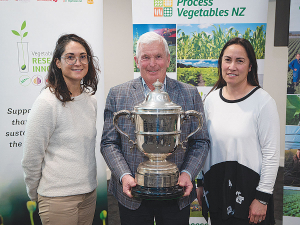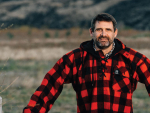The cup is awarded annually in recognition of an outstanding contribution to commercial growing in New Zealand over decades.
Danny Bearsley heads the company he founded, the Bearsley Group. It now specialises in exporting a range of horticultural products - including apples, kiwifruit, potatoes, squash, onions and also sells wine and plums on the local market.
Bearsley is credited with saving the Hawke's Bay process vegetable industry in the 1990s, when a company called Grower Foods got into financial difficulty and he stepped in and kept the company going.
At that time, Grower Foods was processing in excess of 50,000mt of produce annually, a large proportion of this being produced and harvested by Bearsley Farms. Danny attributes the success of the two companies to the dedication of his own staff and of the production supervisors and management at Growers.
After advances from other international processors, Grower Foods was then sold to McCains 5 years later. McCain have since substantially expanded production of most frozen vegetable categories.
HortNZ vice-president Bernadine Balle-Guilleux, who presented the award to Bearsley, says they had some outstanding nominations for the award that reflected the high calibre and long-term commitment of commercial fruit and vegetable growers through New Zealand.
She says HortNZ usually gives out its awards at the annual Horticulture Conference, but the conference had to be cancelled this year due to the uncertainty created by Covid. Bearsley says he's honoured and delighted to be awarded the Bledisloe Cup.
"When they said it was the Bledisloe cup, I thought it was the rugby one," he told Hort News.
In fact, there are five Bledisloe cups - one for rugby, one for horticulture and three relating to the Ahuwhenua awards for the top Maori farmers in dairy, sheep and beef, and horticulture.
An Amazing Career
Danny Bearsley left school at 16 and got a job milking cows.
However, after four years, at the age of just 20, he began his career in horticulture when he bought a hay baler. He bought another one a year later and another one the following year, after taking over the two other contractors servicing the Tutira-Raupunga district.
"I then started growing maize around Putorino and Kotemaori in northern Hawke's Bay, a district that no one else was growing in at that time," he told Hort News.
"The first year I tried 30 acres and it worked and so the next year we planted 700 acres with an average yield of 5mt/acre. I was lucky when I did the 700 acres because the price doubled between planting and harvesting."
Not long after that, Bearsley had another lucky break when Unilever came looking for someone to take over the growing and harvesting of all their sweet corn.
"We were again lucky because the market doubled in the first year from what it was the previous year, so we got off to a really good start and we bought all new machinery," he explains. "We didn't take over any of the old machinery and as a result we did the harvest with two people instead of ten that the previous contractor used."
Bearsley made changes to the way the crop was grown, such as planting closer row widths and the use of better harvesting machinery. He says as a result the yield of the crop averaged ten tonnes an acre - four more than in the past. Sounds great, but it turns out the higher yields became something of an embarrassment to the factory because they couldn't handle the extra production.
It's Not Easy!
Over the years, Danny Bearsley's operations have changed and it's now smaller than it was some years ago. His company employs about 15 permanent staff and hires about 40 RSE workers. The main crops sold are potatoes, onions and carrots to Fiji, arond 500 containers per year. Squash is sent to Asia, with apples and plums also produced, kiwifruit to Zespri and grapes to the winery, which he has a substantial interest in. A special product produced in the winery after vintage are kiwifruit juices. It seems retirement for Bearsley is not an option but says he wouldn't like to be starting out now. He believes it would be impossible to do what he did in his early days - noting that it was much easier then.
Today Bearsley says he wouldn't try getting into the same business and believes it will likely get worse with rampant inflation. He points to all the new water regulations, the acute shortage of willing competent operators and future chemical restrictions. He says all this will just make it so much harder to grow high producing crops.
















